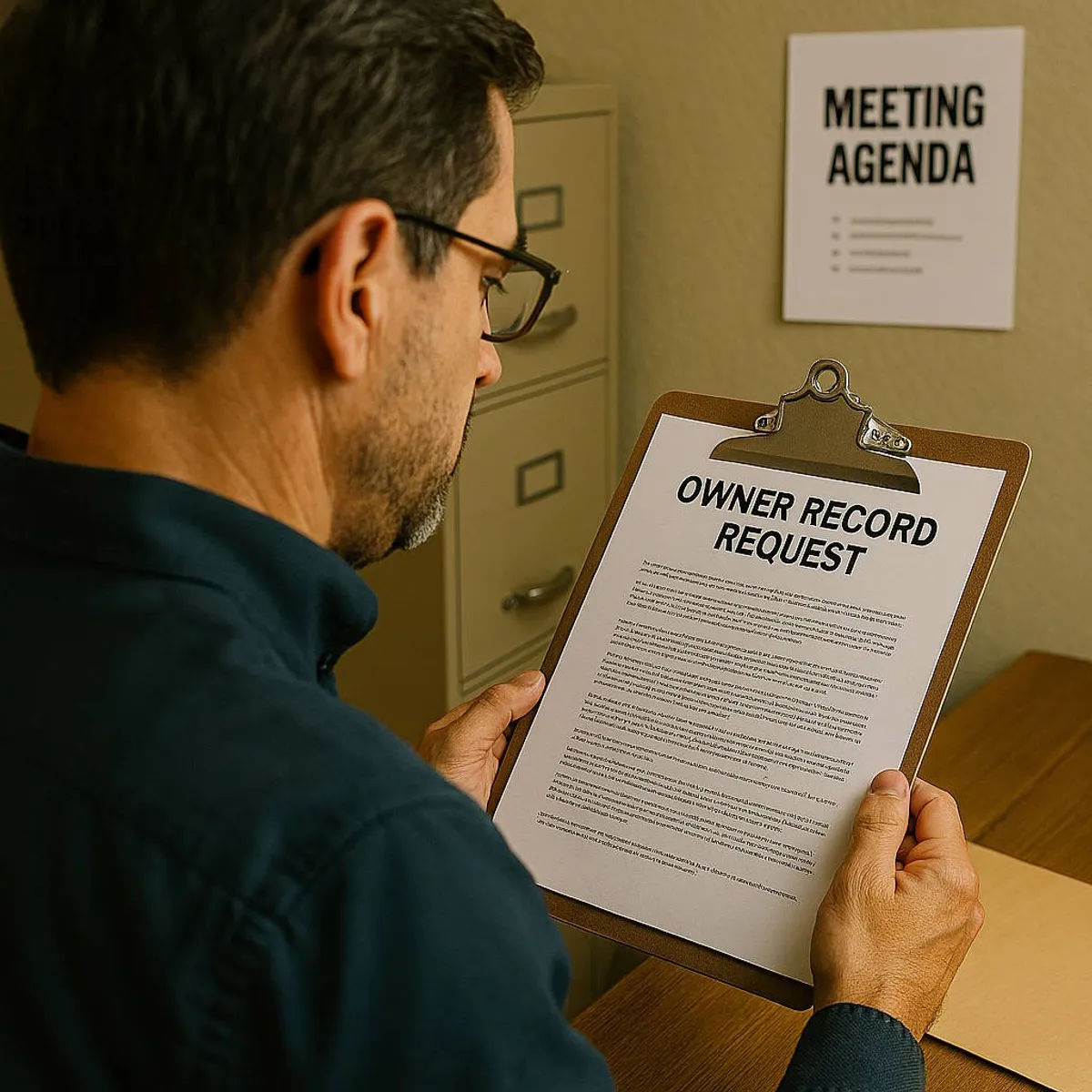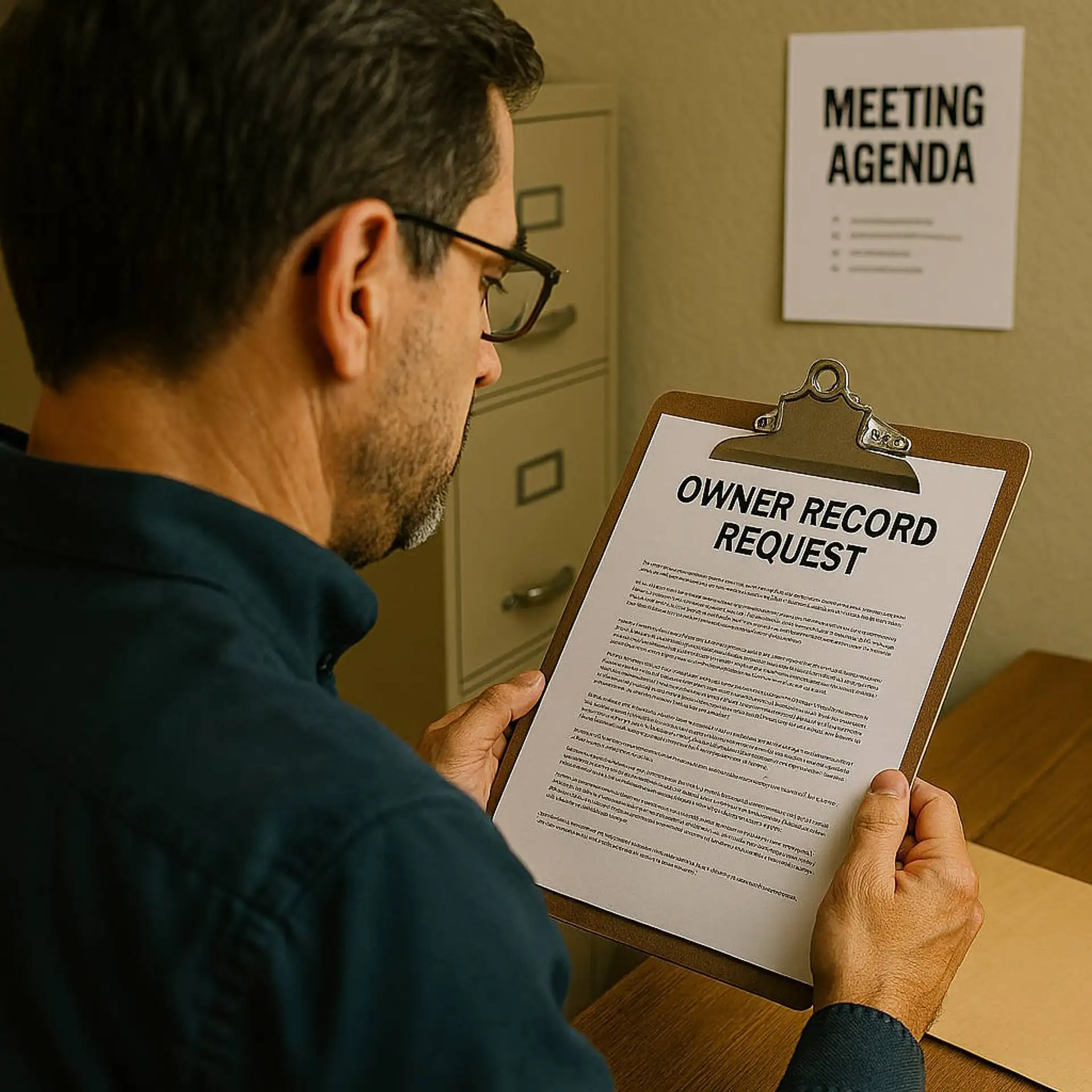What Every Condo Board Needs to Know About Owner Record Requests in Florida
July 11, 2025

What Every Condo Board Needs to Know About Owner Record Requests in Florida
Table of Contents
- Why Record Requests Matter for Florida Boards
- Legal Timeframes and Owner Rights
- What Records Must Be Provided
- How to Respond the Right Way
- Consequences of Non-Compliance
- Final Thoughts
Why Record Requests Matter for Florida Boards
In Florida, condo owners have a statutory right to inspect and obtain records from their association. These rights are not suggestions—they are protected under Florida Statute §718.111(12) and enforced by the DBPR (Department of Business and Professional Regulation).
A unit owner doesn’t need to state a reason. All it takes is a written request, and the clock starts ticking. From that point forward, your board has 10 working days to respond—or face legal and financial consequences.
This issue becomes especially serious when:
- Minutes weren’t approved in time
- Digital records are missing
- A new board doesn’t know where documents live
The most common DBPR complaints are tied to documentation and access failures—record requests are often the first step in a larger investigation.
Legal Timeframes and Owner Rights
Florida Statute 718.111(12)(b) clearly states:
“The official records of the association shall be made available to a unit owner within 10 working days after receipt of a written request by the board or its designee.”
Key obligations include:
- Responding within 10 business days
- Making records available for inspection
- Not charging for inspection (only for printed copies, at a reasonable rate)
- Allowing owners to bring their own device for scanning or photography
Requests may be made:
- In writing (paper or email)
- By any unit owner, co-owner, or designated agent
- For any official record of the association (with limited exceptions)
What Records Must Be Provided
Florida law requires condo boards to maintain a wide range of “official records.” These must be made available upon request unless exempt.
✅ Required and Shareable Records:
- Meeting minutes
- Notices and agendas
- Financial reports, ledgers, budgets
- Contracts and bids
- Insurance policies
- Reserve studies and inspection reports
- Voting records and sign-in sheets
- Board member rosters
❌ Exempt or Restricted Records:
- Personal identifying info (SSNs, bank info, medical data)
- Legal communications protected by attorney-client privilege
- Disciplinary reports about employees (non-board personnel)
Maintaining clarity on what is shareable vs. protected is critical—mistakes in either direction can trigger complaints or lawsuits.
How to Respond the Right Way
Here’s how your board can ensure timely, compliant record request fulfillment:
1. Log and Acknowledge the Request
Create a dated log entry including:
- Requesting owner name
- Date received
- Documents requested
- Due date for response
If possible, acknowledge receipt via email.
2. Gather and Review the Requested Records
Use your digital archive or compliance portal to locate the documents. Ensure:
- Files are the most recent version
- There are no redaction issues
- Sensitive information is excluded
3. Provide Access in an Owner-Friendly Way
You can fulfill the request by:
- Inviting the owner to inspect in person at a set time
- Emailing digital copies (PDF)
- Providing access through your compliance portal
- Letting the owner scan using their own phone or laptop
Boards may charge up to 25 cents per printed page, but no fee may be charged for inspection or for scans by the owner.
4. Document the Completion
Log:
- How the request was fulfilled (email, in person, upload)
- Who handled it
- When access was granted
This becomes your legal defense if a complaint is filed.
Consequences of Non-Compliance
Failure to respond properly can trigger:
- Statutory damages: $50 per day, up to $500 total
- Presumption of willful violation under DBPR rules
- DBPR administrative complaints
- Lawsuits for breach of fiduciary duty
Even worse, a mishandled request may escalate owner mistrust, public criticism at meetings, or additional legal scrutiny—especially if minutes or notices are missing.
Don’t let a minor paperwork issue become a legal crisis.
📘 Need help organizing the records your board is required to maintain?
👉 Learn What HB 913 Requires →
Final Thoughts
Handling owner record requests correctly is one of the simplest, clearest ways to avoid legal trouble.
Boards don’t need a legal degree or fancy software—but they do need a plan, a document archive, and a reliable workflow.
👉 Start Your Free Trial →
Our platform helps boards log, fulfill, and track owner record requests — all in compliance with Florida Statute 718.
Give owners what they need. Keep your board protected.

